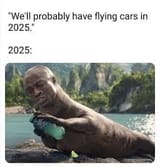Search Results
6/24/2025, 12:57:14 PM
>>17787340
Lost futures. Read Mark Fisher.
Back in those days, people had wild hopes about the future. They didn't consider their own lives amazing (those posters were literally just ads, the 1950s equivalent of shitty Alegria corporate art), they were discontent with many things about the present. But there was a general sense that the future will be better.
Just compare popular science fiction of than and today. Then, it was depicting abundant societies that solved their worst problems, all the conflicts happened in the peripheries in space, where people went out to find adventure. Today, the most popular genres of science fiction are dytopias and post-apocalpyse.
Why is that? Because we know from that older art that the amazing futures past generations expected didn't come true, so there is a general cynicism regarding the future which in turn leads to people projecting utopia to an imagined past.
Lost futures. Read Mark Fisher.
Back in those days, people had wild hopes about the future. They didn't consider their own lives amazing (those posters were literally just ads, the 1950s equivalent of shitty Alegria corporate art), they were discontent with many things about the present. But there was a general sense that the future will be better.
Just compare popular science fiction of than and today. Then, it was depicting abundant societies that solved their worst problems, all the conflicts happened in the peripheries in space, where people went out to find adventure. Today, the most popular genres of science fiction are dytopias and post-apocalpyse.
Why is that? Because we know from that older art that the amazing futures past generations expected didn't come true, so there is a general cynicism regarding the future which in turn leads to people projecting utopia to an imagined past.
Page 1
